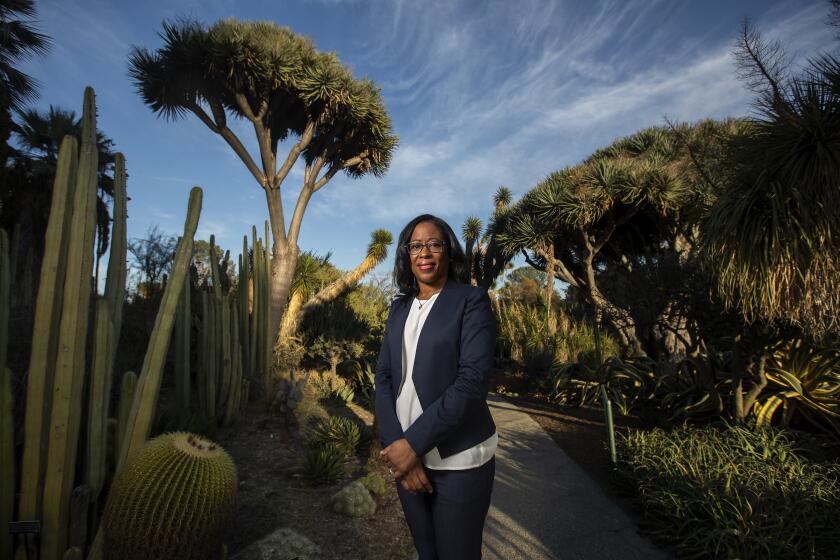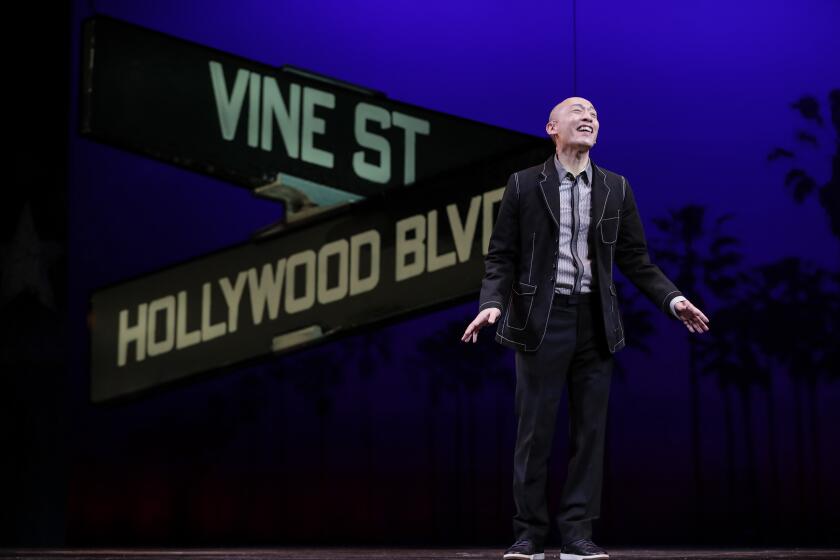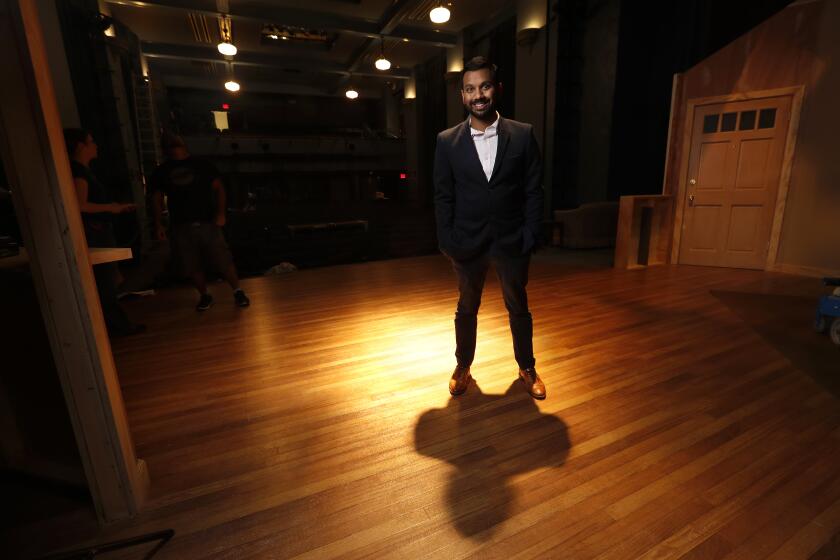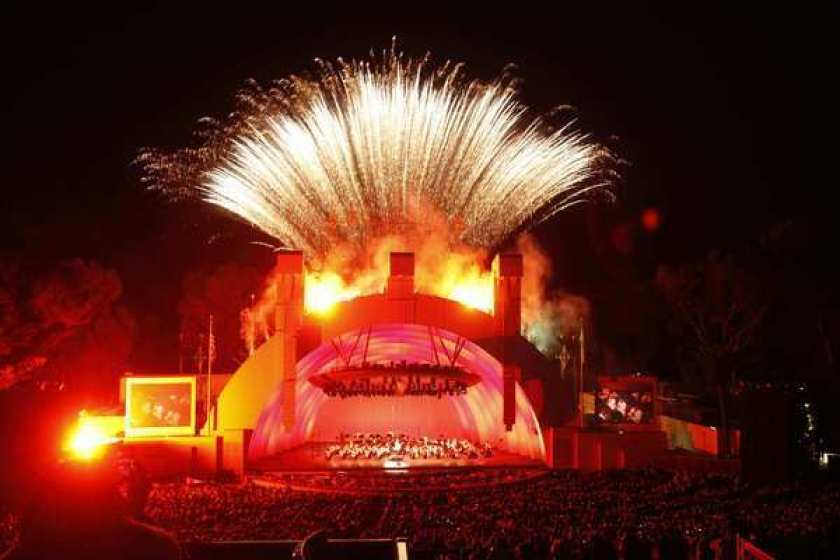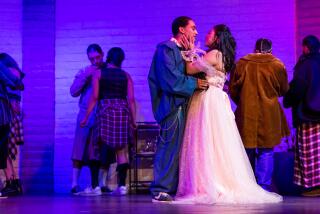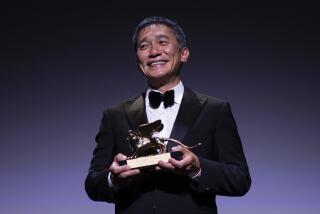An Asian actor got disrespected at L.A. theater awards. What happened next was swift and powerful
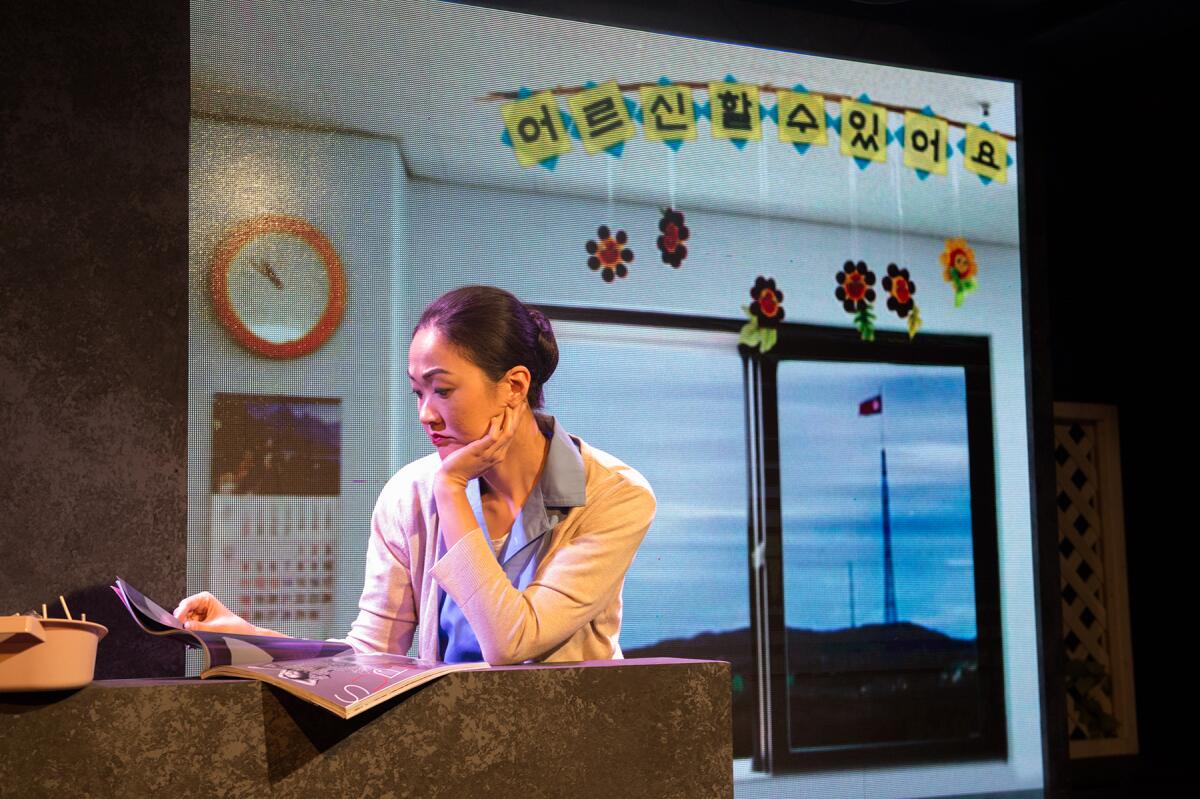
When it happened, those watching couldn’t quite believe what they had just seen and heard. During the Ovation Awards for local theater Tuesday night, a nominee in the category of featured actress in a play had her name mispronounced — and when her face was supposed to appear onscreen, the photo of a fellow Asian American cast member popped up instead.
Jully Lee saw a picture of a woman who was not her, and she was stunned. Her first response was to laugh. She didn’t even realize her name had been mispronounced too until the incident began boiling over on social media. “Oh no, that too?” thought Lee, who was nominated for her work in “Hannah and the Dread Gazebo,” a co-presentation of East West Players and the Fountain Theatre.
Lee’s first name has been mispronounced for much of her life, so this was not new, she said in an interview. But she knew in her heart that this was a sign of a bigger problem.
“This wasn’t a personal attack on me by L.A. Stage Alliance. Clearly I didn’t matter enough for it to be personal,” she said. “I just felt like a nameless, faceless, Asian person that happened to be nominated for one of their awards.”
Henry E. Huntington busted unions and exploited Mexican labor. His museum’s leadership was white for a century. Now the keepers of his collection are making change with the museum at a critical juncture
L.A. Stage Alliance, the nonprofit that holds the Ovation Awards, was hard hit like the rest of the local theater industry, furloughing its three full-time staff members starting in July but still moving forward with a prerecorded awards show. The nominees’ names — several were mispronounced, Lee said — were announced in voice-over, and the winners’ names were all read out, correctly, by the night’s host, Celebration Theatre Artistic Director Michael A. Shepperd.
At first Lee didn’t want to make a big deal out of what happened, but then she began scrolling through the reactions on social media. Many decried the stereotype that all Asians look alike. For some, the incident also taps into longstanding feelings of marginalization by non-Asian people who can’t be bothered to learn correct name pronunciation.
“There was so much anger and pain that was being expressed,” she said, trying to hold back tears. “It wasn’t just me, it was what this mistake represented for so many people.”
For those watching, the disrespect to Lee — and the apology that followed — stoked concerns about L.A. Stage Alliance and its broader record on equity, diversity and inclusion over its 45-year history.
The program for this year’s awards listed only the Fountain as producer for Lee’s play. East West Players — one of the nation’s largest, most important Asian American theater companies — was not mentioned during the ceremony.
L.A. Stage Alliance’s long history of not giving equal billing to co-presenters has been hotly contested by members over the years. The policy almost always favors larger organizations with predominantly white leadership, said East West Players Artistic Director Snehal Desai.
Desai said that as he began to comprehend what had happened at the Ovation Awards, he knew he had to act.
He decided to revoke the company’s membership to the L.A. Stage Alliance, effective immediately, and he encouraged colleagues in the theater community to do the same. As of Thursday afternoon, at least 25 companies had left in solidarity, including some of the region’s largest and most influential: Center Theatre Group, Geffen Playhouse, Pasadena Playhouse, A Noise Within, Rogue Machine, Boston Court, Latino Theatre Company, Playwrights’ Arena, the Fountain and Deaf West Theatre, which noted that the awards were staged without closed captioning or an ASL interpreter despite a direct request from the company. The theater groups’ statements are trending on Instagram under #LeavingLASA.
What role can art play in opening eyes to the humanity of people different from ourselves? After the Atlanta-area shootings, the answer is urgent.
Desai said his first thought was of Lee. After the killings of Asian women at Atlanta spas, Lee joined other female panelists in an East West Players-organized conversation, speaking in “heartbreaking detail about how they had been attacked, marginalized, exoticized and erased,” Desai said.
L.A. Stage Alliance, which listed more than 150 member organizations in its Ovation program, apologized late Tuesday night with a statement that read in part: “There no excuse for mispronouncing Ms. Lee’s name nor for the error in the image used. We take full responsibility for the oversight.”
After a day of withering criticism about a statement that did not offer a plan of action and did not address longstanding concerns about equity within the organization, late Wednesday the alliance, which aims to be a resource and advocacy organization, posted a four-point plan for “transparent transformation.”
The Times reached out to L.A. Stage Alliance board President Marco Gomez but did not hear back.
All of this comes after years of erasure of the Asian American Pacific Islander community, critics say. Desai said East West Players’ call for others in the theater world to revoke L.A. Stage Alliance membership was a powerful way to get beyond statements of solidarity and to move into action.
“I don’t want the burden of righting this to be on East West Players and communities of color,” he said.
Meghan Pressman, managing director and chief executive of the region’s largest nonprofit theater, Center Theatre Group, said her company plans to follow through in whatever ways are needed.
“We said we were going to listen to the leaders of color on our area and find out how we can support them,” Pressman said. “This is loud and clear.”
Pressman said CTG, which has faced criticism for its own record on equity and inclusion, will move forward by listening to and by centering the voices of BIPOC artists without asking them to do the heavy lifting of change.
The 46-year-old theater association collapses after more than 50 members pull out. Critics say Ovation Awards mistakes reflect long-standing problems.
The problems with the Ovation Awards, critics say, echo concerns with other awards shows, including the Oscars and the Golden Globes. The Ovation voting pool of about 300 people is predominantly white. Of the L.A. Stage Alliance’s four board members, only one is not white. The staff was all white.
Michaela Bulkley, who had been director of programs and development, said this year’s Ovation Awards were organized and produced without any input from the furloughed staff. She watched anyway and said she was saddened by what she saw.
“It kind of felt like a horror movie, because it was in that moment that we all knew there was probably no coming back from that,” Bulkley said.
Bulkley produced the 2019 awards ceremony and said she knows just how much work goes into putting the show together. Last summer she pushed for a reorganization of the voting pool, she said, which does not change much because voting rights are granted for life.
“I would go to board meetings and it was all predominantly white men, and the way that certain issues in the community were talked about were not necessarily appropriate,” Bulkley said.
Long-shuttered theater companies, music groups and others were shocked Tuesday by plans for full reopening by mid-June. How realistic is the timeline?
When the staff furloughs were announced in July, a letter went out to members stating: “During this time, LASA will also undergo organizational restructuring and reflection taking into consideration the various social issues facing our community and stakeholders so we can work towards a more inclusive and equitable model.”
The existence of that statement, and the realization during the Ovation Awards of just how short of that goal LASA had fallen, made the night even harder to handle for many.
“It’s about the follow-through,” Desai said about #LeavingLASA. “Now is when the work begins.”
After a canceled season in 2020 — the first in 98 years — the Bowl will reopen with free shows for healthcare, grocery and other essential workers.
More to Read
The biggest entertainment stories
Get our big stories about Hollywood, film, television, music, arts, culture and more right in your inbox as soon as they publish.
You may occasionally receive promotional content from the Los Angeles Times.
